#car models
Explore tagged Tumblr posts
Text

to the family car!
#trafficblr#wild life smp#life series#mcyt#fanart#my art#@the person who made a 3d model of this car: i owe you my life
12K notes
·
View notes
Text

#black tumblr#black women#black woman appreciation#black femininity#black culture#black fashion#black art#black beauty#black model#black girl aesthetic#black girl moodboard#black girl luxury#black girl next door#classic cars#flowers#black womanhood#black woman aesthetic#black woman femininity#black girls of tumblr#black girl fashion#black woman beauty#black girl magic
4K notes
·
View notes
Text
Tesla accused of hacking odometers to weasel out of warranty repairs
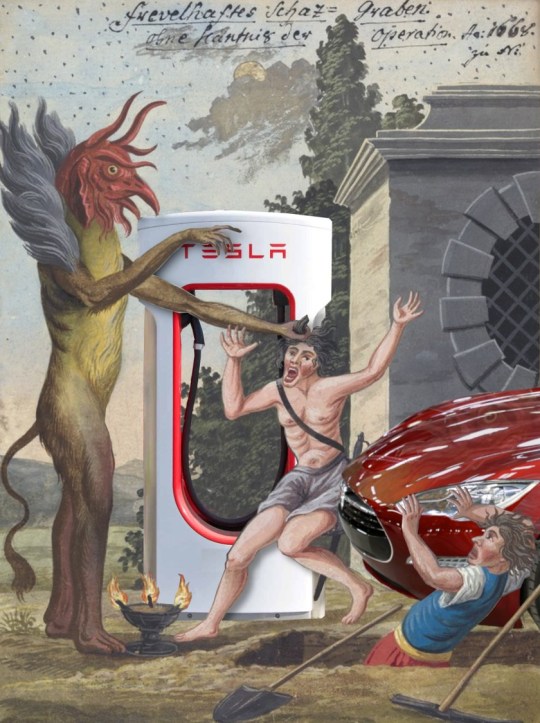
I'm on a 20+ city book tour for my new novel PICKS AND SHOVELS. Catch me at NEW ZEALAND'S UNITY BOOKS in AUCKLAND on May 2, and in WELLINGTON on May 3. More tour dates (Pittsburgh, PDX, London, Manchester) here.

A lawsuit filed in February accuses Tesla of remotely altering odometer values on failure-prone cars, in a bid to push these lemons beyond the 50,000 mile warranty limit:
https://www.thestreet.com/automotive/tesla-accused-of-using-sneaky-tactic-to-dodge-car-repairs
The suit was filed by a California driver who bought a used Tesla with 36,772 miles on it. The car's suspension kept failing, necessitating multiple servicings, and that was when the plaintiff noticed that the odometer readings for his identical daily drive were going up by ever-larger increments. This wasn't exactly subtle: he was driving 20 miles per day, but the odometer was clocking 72.35 miles/day. Still, how many of us monitor our daily odometer readings?
In short order, his car's odometer had rolled over the 50k mark and Tesla informed him that they would no longer perform warranty service on his lemon. Right after this happened, the new mileage clocked by his odometer returned to normal. This isn't the only Tesla owner who's noticed this behavior: Tesla subreddits are full of similar complaints:
https://www.reddit.com/r/RealTesla/comments/1ca92nk/is_tesla_inflating_odometer_to_show_more_range/
This isn't Tesla's first dieselgate scandal. In the summer of 2023, the company was caught lying to drivers about its cars' range:
https://pluralistic.net/2023/07/28/edison-not-tesla/#demon-haunted-world
Drivers noticed that they were getting far fewer miles out of their batteries than Tesla had advertised. Naturally, they contacted the company for service on their faulty cars. Tesla then set up an entire fake service operation in Nevada that these calls would be diverted to, called the "diversion team." Drivers with range complaints were put through to the "diverters" who would claim to run "remote diagnostics" on their cars and then assure them the cars were fine. They even installed a special xylophone in the diversion team office that diverters would ring every time they successfully deceived a driver.
These customers were then put in an invisible Tesla service jail. Their Tesla apps were silently altered so that they could no longer book service for their cars for any reason – instead, they'd have to leave a message and wait several days for a callback. The diversion center racked up 2,000 calls/week and diverters were under strict instructions to keep calls under five minutes. Eventually, these diverters were told that they should stop actually performing remote diagnostics on the cars of callers – instead, they'd just pretend to have run the diagnostics and claim no problems were found (so if your car had a potentially dangerous fault, they would falsely claim that it was safe to drive).
Most modern cars have some kind of internet connection, but Tesla goes much further. By design, its cars receive "over-the-air" updates, including updates that are adverse to drivers' interests. For example, if you stop paying the monthly subscription fee that entitles you to use your battery's whole charge, Tesla will send a wireless internet command to your car to restrict your driving to only half of your battery's charge.
This means that your Tesla is designed to follow instructions that you don't want it to follow, and, by design, those instructions can fundamentally alter your car's operating characteristics. For example, if you miss a payment on your Tesla, it can lock its doors and immobilize itself, then, when the repo man arrives, it will honk its horn, flash its lights, back out of its parking spot, and unlock itself so that it can be driven away:
https://tiremeetsroad.com/2021/03/18/tesla-allegedly-remotely-unlocks-model-3-owners-car-uses-smart-summon-to-help-repo-agent/
Some of the ways that your Tesla can be wirelessly downgraded (like disabling your battery) are disclosed at the time of purchase. Others (like locking you out and summoning a repo man) are secret. But whether disclosed or secret, both kinds of downgrade depend on the genuinely bizarre idea that a computer that you own, that is in your possession, can be relied upon to follow orders from the internet even when you don't want it to. This is weird enough when we're talking about a set-top box that won't let you record a TV show – but when we're talking about a computer that you put your body into and race down the road at 80mph inside of, it's frankly terrifying.
Obviously, most people would prefer to have the final say over how their computers work. I mean, maybe you trust the manufacturer's instructions and give your computer blanket permission to obey them, but if the manufacturer (or a hacker pretending to be the manufacturer, or a government who is issuing orders to the manufacturer) starts to do things that are harmful to you (or just piss you off), you want to be able to say to your computer, "OK, from now on, you take orders from me, not them."
In a state of nature, this is how computers work. To make a computer ignore its owner in favor of internet randos, the manufacturer has to build in a bunch of software countermeasures to stop you from reconfiguring or installing software of your choosing on it. And sure, that software might be able to withstand the attempts of normies like you and me to bypass it, but given that we'd all rather have the final say over how our computers work, someone is gonna figure out how to get around that software. I mean, show me a 10-foot fence and I'll show you an 11-foot ladder, right?
To stop that from happening, Congress passed the 1998 Digital Millennium Copyright Act. Despite the word "copyright" appearing in the name of the law, it's not really about defending copyright, it's about defending business models. Under Section 1201 of the DMCA, helping someone bypass a software lock is a felony punishable by a five-year prison sentence and a $500,000 fine (for a first offense). That's true whether or not any copyright infringement takes place.
So if you want to modify your Tesla – say, to prevent the company from cheating your odometer – you have to get around a software lock, and that's a felony. Indeed, if any manufacturer puts a software lock on its product, then any changes that require disabling or bypassing that lock become illegal. That's why you can't just buy reliable third-party printer ink – reverse-engineering the "is this an original HP ink cartridge?" program is a literal crime, even though using non-HP ink in your printer is absolutely not a copyright violation. Jay Freeman calls this effect "felony contempt of business model."
Thus we arrive at this juncture, where every time you use a product or device or service, it might behave in a way that is totally unlike the last time you used it. This is true whether you own, lease or merely interact with a product. The changes can be obvious, or they can be subtle to the point of invisibility. And while manufacturers can confine their "updates" to things that make the product better (for example, patching security vulnerabilities), there's nothing to stop them from using this uninspectable, non-countermandable veto over your devices' functionality to do things that harm you – like fucking with your odometer.
Or, you know, bricking your car. The defunct EV maker Fisker – who boasted that it made "software-based cars" – went bankrupt last year and bricked the entire fleet of unsold cars:
https://pluralistic.net/2024/10/10/software-based-car/#based
I call this ability to modify the underlying functionality of a product or service for every user, every time they use it, "twiddling," and it's a major contributor to enshittification:
https://pluralistic.net/2023/02/19/twiddler/
Enshittification's observable symptoms follow a predictable pattern: first, a company makes things good for its users, while finding ways to lock them in. Then, once it knows the users can't easily leave, the company makes things worse for end-users in order to deliver value to business customers. Once these businesses are locked in, the company siphons value away from them, too, until the product or service is a pile of shit, that we still can't leave:
https://pluralistic.net/2025/02/26/ursula-franklin/#franklinite
Twiddling is key to enshittification: it's the method by which value is shifted from end-users to business customers, and from business customers to the platform. Twiddling is the "switch" in enshittification's series of minute, continuous bait-and-switches. The fact that DMCA 1201 makes it a crime to investigate systems with digital locks makes the modern computerized device a twiddler's playground. Sure, a driver might claim that their odometer is showing bad readings, but they can't dump their car's software and identify the code that is changing the odometer.
This is what I mean by "demon-haunted computers": a computer is "demon-haunted" if it is designed to detect when it is under scrutiny, and, when it senses a hostile observer, it changes its behavior to the innocuous, publicly claimed factory defaults:
https://pluralistic.net/2024/01/18/descartes-delenda-est/#self-destruct-sequence-initiated
But as soon as the observer goes away, the computer returns to its nefarious ways. This is exactly what happened with Dieselgate, when VW used software that detected the test-suite run by government emissions inspectors, and changed the engine's characteristics when it was under their observation. But once the car was back on the road, it once again began emitting toxic gas at levels that killed killed dozens of people and sickened thousands more:
https://www.nytimes.com/2015/09/29/upshot/how-many-deaths-did-volkswagens-deception-cause-in-us.html
Cars are among the most demon-haunted products we use on a daily basis. They are designed from the chassis up to do things that are harmful to their owners, from stealing our location data so it can be sold to data-brokers, to immobilizing themselves if you miss a payment, to downgrading themselves if you stop paying for a "subscription," to ratting out your driving habits to your insurer:
https://pluralistic.net/2023/07/24/rent-to-pwn/#kitt-is-a-demon
These are the "legitimate" ways that cars are computers that ignore their owners' orders in favor of instructions they get from the internet. But once a manufacturer arrogates that power to itself, it is confronted with a tempting smorgasbord of enshittificatory gambits to defraud you, control you, and gaslight you. Now, perhaps you could wield this power wisely, because you are in possession of the normal human ration of moral consideration for others, to say nothing of a sense of shame and a sense of honor.
But while corporations are (legally) people, they are decidedly not human. They are artificial lifeforms, "intellects vast and cool and unsympathetic" (as HG Wells said of the marauding aliens in War of the Worlds):
https://pluralistic.net/2025/04/14/timmy-share/#a-superior-moral-justification-for-selfishness
These alien invaders are busily xenoforming the planet, rendering it unfit for human habitation. Laws that ban reverse-engineering are a devastating weapon that corporations get to use in their bid to subjugate and devour the human race.
The US isn't the only country with a law like Section 1201 of the DMCA. Over the past 25 years, the US Trade Representative has arm-twisted nearly every country in the world into passing laws that are nearly identical to America's own disastrous DMCA. Why did countries agree to pass these laws? Well, because they had to, or the US would impose tariffs on them:
https://pluralistic.net/2025/03/03/friedmanite/#oil-crisis-two-point-oh
The Trump tariffs change everything, including this thing. There is no reason for America's (former) trading partners to continue to enforce the laws it passed to protect Big Tech's right to twiddle their citizens. That goes double for Tesla: rather than merely complaining about Musk's Nazi salutes, countries targeted by the regime he serves could retaliate against him, in a devastating fashion. By abolishing their anticircuvmention laws, countries around the world would legalize jailbreaking Teslas, allowing mechanics to unlock all the subscription features and software upgrades for every Tesla driver, as well as offering their own software mods. Not only would this tank Tesla stock and force Musk to pay back the loans he collateralized with his shares (loans he used to buy Twitter and the US predidency), it would also abolish sleazy gimmicks like hacking drivers' odometers to get out of paying for warranty service:
https://pluralistic.net/2025/03/08/turnabout/#is-fair-play

If you'd like an essay-formatted version of this post to read or share, here's a link to it on pluralistic.net, my surveillance-free, ad-free, tracker-free blog:
https://pluralistic.net/2025/04/15/musklemons/#more-like-edison-amirite

Image: Steve Jurvetson (modified) https://commons.wikimedia.org/wiki/File:Tesla_Model_S_Indoors.jpg
CC BY 2.0 https://creativecommons.org/licenses/by/2.0/deed.en
#pluralistic#tesla#demon-haunted cars#autoenshittification#fraud#odomoter fraud#automotive#dieselgate#elon musk#musk#enshittification#1201#dmca 1201#felony contempt of business model#repair#right to repair
3K notes
·
View notes
Text
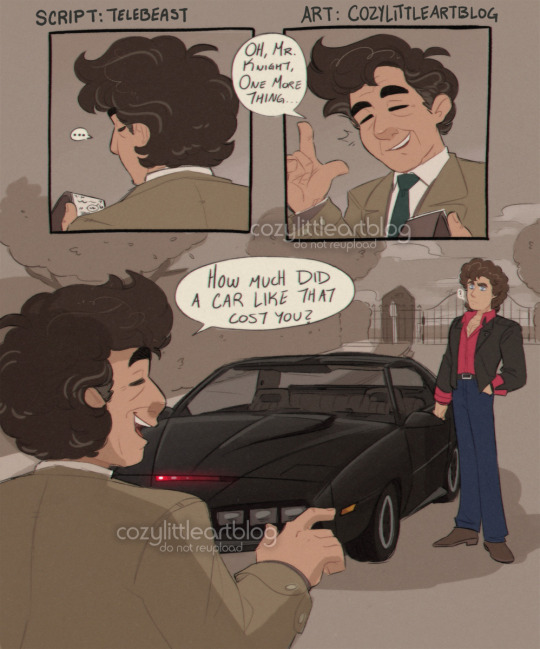
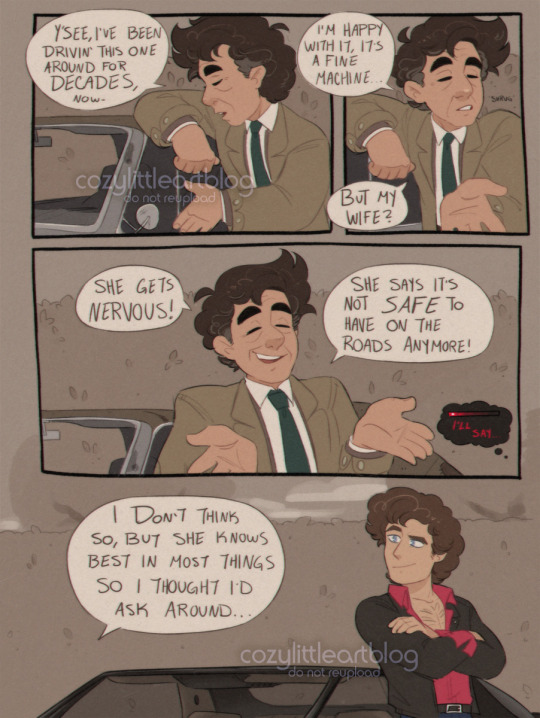
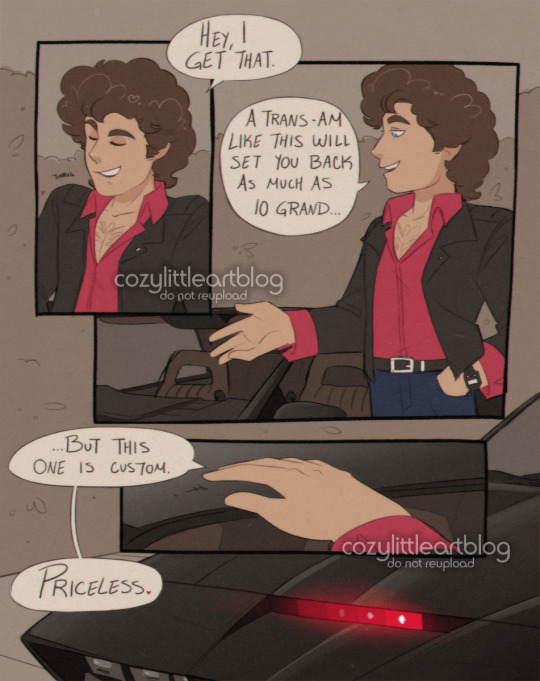
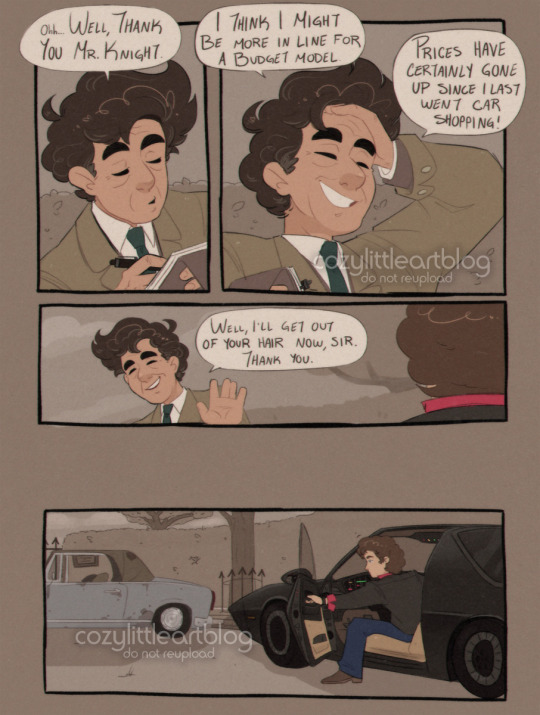
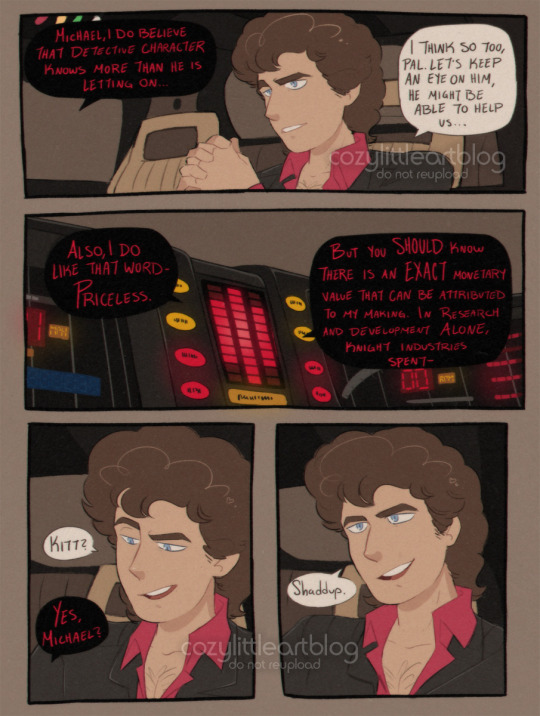
Columbo and the Knight (1984)
put me in the universe where Columbo ran through the 1980s and had a crossover episode with Knight Rider. I think they deserved it, and I am not just saying that because they're my two favorite Old Shows. @telebeast wrote a little fanfic blurb about it and I HAD to visualize it into a comic (which is also the longest comic I have finished thus far at five pages...), so writing credit goes to them.
Autism W!
#columbo#knight rider#art#michael knight#kitt#comic#highlight reel#crossover#telebeast#there are two small easter eggs here. can you find them. they were somehow not Entirely lost when i resized these for the public#this is what i mean when i say I Draw And It's Everyone Else's Problem. look at my INCREDIBLY niche crossover comic boy#if the knight rider fandom has like 12 people in it. how many of y'all have seen columbo#this comic is for like 4 people and me and phoenix are already two of them#niche is my specialty lets be real. weird niche obscure shit and ships nobody's paid attention to yet#not to suggest this is ship art. columbo has his wife and michael has his car lmfao#stylizing real people is EXTREMELY hard btw sorry for when they get off model. its partly a 'better imperfect than never finished' situatio#cant tell you how much i redrew some of these panels. weeps#this took me 2 weeks but i think i thumbnailed it all in may and the ideas been rollin around in my head since march#is anybody good at editing. please edit michael and columbo into an image together like its a screenshot. NOT generated. edited.#it would be so cool#ive drawn columbo a lot but i haven't drawn a lot of michaels. i was learning things about his outfit AS I WAS DOING THE DAMN#COLORS ON THIS. all the lines done. it was too late to change anything. i did all the lines and colored page by page#i realized my mistakes on like page 3. 1 and 2 were already done. it was Too Late.#imagine it though. them working a case together. switching between the more serious tone of columbo vs the goofier#action antics of michael and kitt. columbo being so impressed by Modern Technology. there's more i could say but phoenix may write#more of this crossover and i don't want to spoil it :'3#there's opportunity here though i swear. there's gold to be dug.#i like how kitt gets shading but columbo's junker peugeot doesn't. kitt looked wrong without any. columbo's car is matte and dirty#i also applied effects to this to make it look a little film-grainy and VHS like. some CRT TV vibes#the only question left is. did they put knight rider into columbo; or columbo into knight rider 🤔
4K notes
·
View notes
Text



Untitled, 2024, (Tesla Model 3 crushed by replica Olmec Head), by Chavis Mármol. The Mexican artist created the work last year “to satirise the Tesla brand and its creator.”
1K notes
·
View notes
Text
Okay. It is a house cleanup and packing day. I need to accomplish tasks and do the things I have been procrastinating on. This is terrible, and I hate it.
#i was gonna push this back to next sunday but i accidentally volunteered myself for a sidequest#gonna drive to the far side of chicago to pick up a 6 foot square architectural model for my brother to use as wall art#and as a return favor he's responsible for selling my car because i dont wanna do it#but that means that i have to do chores Today#life is awful im gonna consume an unwise amount of caffeine
1K notes
·
View notes
Text

Porsche
781 notes
·
View notes
Text


Wait.. aren’t I supposed to sit on your hood or something.. before you start taking pictures? 🏁🏎️💨
#hooters racing#car model#PSD clothing#Nopi girl#car girl#trans#transgender#trans pride#transisbeautiful#mtf#transgirl#girlslikeus#mtf hrt#maletofemale#transformation#trans women are beautiful#trans women#trans woman#transsexual#trans positivity#trans people#trans sex worker#this is what trans looks like#trans experience#trans feminine#trans girl#trans community#actually mtf#mtf positivity#mtf pride
2K notes
·
View notes
Text

Sunbeam Tiger (1965)
#cars#cool#cool cars#car#classic car#vintage#motor#classic#drive#driving#sunbeam#friday#weekend#winter#1960s model#1960s fashion#1960s history#1960s style#sixties#1960s advertising#1960s#60s vintage#60s fashion#60s aesthetic#60s style#60s
427 notes
·
View notes
Text

Dinosaurs fucking up cars is how that trend went, right?
#digimon#digimon fanart#black growmon#if you guess which car model it is I'll uhhhhh dunno I'll sketch your oc
449 notes
·
View notes
Text
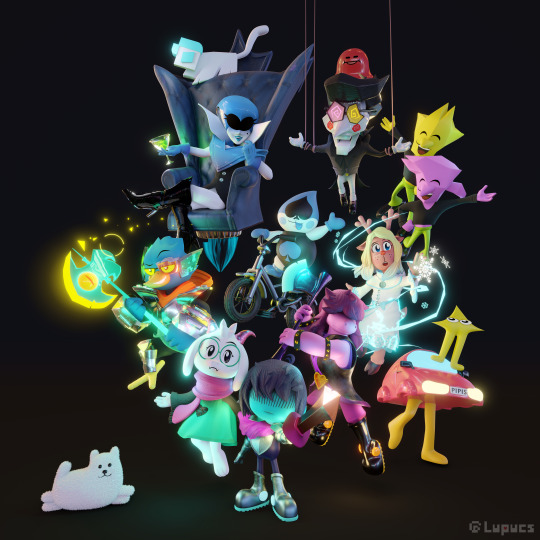
All of my Dark World Deltarune models in one pic! 🃏






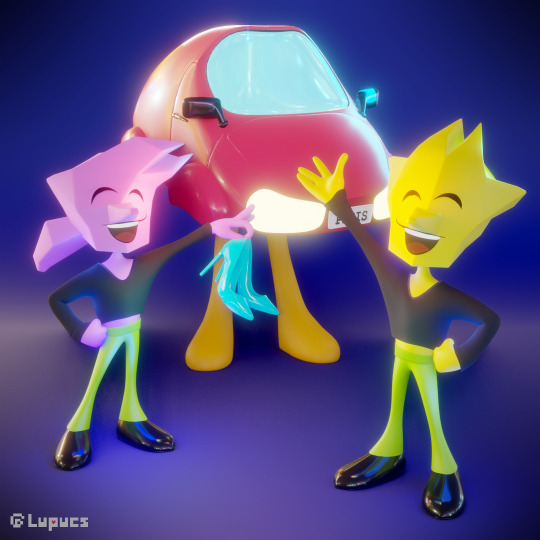
Details:

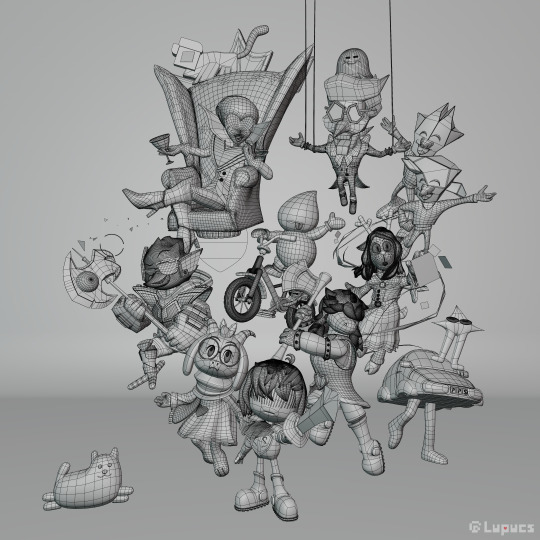
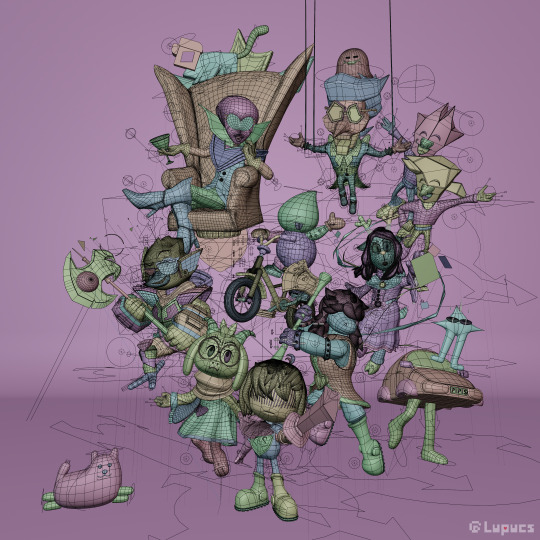
Wanted to make a group render since I've translated most of the cast in 3D!
I'm really happy with how these turned out even though some of these kinda differ in quality as I've made them over the course of a bunch of months/years. These were super fun to make and an amazing learning experience (Light World Render coming soon!). Who's your fave?
#deltarune#blender#3D#3d modeling#blender 3d#kris dreemurr#ralsei#susie deltarune#noelle holiday#berdly#lancer#spamton#addisons#queen deltarune#tasque#nubert#starwalker#car with legs#i definitely dont have a hyperfixation
2K notes
·
View notes
Text

i would like to share this VERY handy tutorial on drawing cars by the ever-immaculate EtheringtonBrothers (twitter, instagram)
#tutorial#cars#etheringtonbrothers#knight rider#transformers#resources#tagging the two fandoms i can think of who might need this the most lmfao#thank you EB i would never be able to draw kitt without you o7 coupled with my gmod references of a kitt car model too of course#please check out their accounts they have so so so many good tutorials. absolutely phenomenal tutorials. on like Everything ever#i know cars are THE biggest pain in the ass to draw ever so here's where i learned it 👉👉#you still gotta do a bit of thinking but its amazing how much even just this one trick can do for you. it carries HARD
829 notes
·
View notes
Text
the fact that "don't cry, craft" is genuinely some of the best life advice i've ever heard
#so i was miserable earlier#and then i remembered this#and that i was looking at the art supply online shop#and was considering getting some modelling clay#and then i thought of one of my favourite artists on here#who mainly works in ceramics. but they also have paper mache pieces#and then i thought. sophia#you can do paper mache#so now i. a fully grown 28 year old woman. am spending my sunday crafting with paper mache#as if that wasn't whimsically childlike enough i am making a little formula 1 car and when it's fully formed and dried i can paint it#with a tacky horrible garish little livery#guys this is so much fun#always craft.#especially when you wanna cry#dan and phil#phan
230 notes
·
View notes
Text
Your car spies on you and rats you out to insurance companies
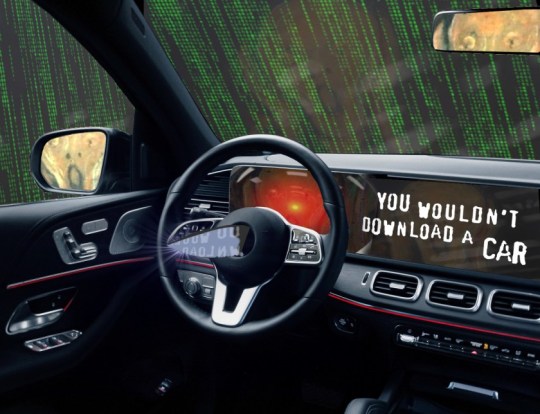
I'm on tour with my new, nationally bestselling novel The Bezzle! Catch me TOMORROW (Mar 13) in SAN FRANCISCO with ROBIN SLOAN, then Toronto, NYC, Anaheim, and more!

Another characteristically brilliant Kashmir Hill story for The New York Times reveals another characteristically terrible fact about modern life: your car secretly records fine-grained telemetry about your driving and sells it to data-brokers, who sell it to insurers, who use it as a pretext to gouge you on premiums:
https://www.nytimes.com/2024/03/11/technology/carmakers-driver-tracking-insurance.html
Almost every car manufacturer does this: Hyundai, Nissan, Ford, Chrysler, etc etc:
https://www.repairerdrivennews.com/2020/09/09/ford-state-farm-ford-metromile-honda-verisk-among-insurer-oem-telematics-connections/
This is true whether you own or lease the car, and it's separate from the "black box" your insurer might have offered to you in exchange for a discount on your premiums. In other words, even if you say no to the insurer's carrot – a surveillance-based discount – they've got a stick in reserve: buying your nonconsensually harvested data on the open market.
I've always hated that saying, "If you're not paying for the product, you're the product," the reason being that it posits decent treatment as a customer reward program, like the little ramekin warm nuts first class passengers get before takeoff. Companies don't treat you well when you pay them. Companies treat you well when they fear the consequences of treating you badly.
Take Apple. The company offers Ios users a one-tap opt-out from commercial surveillance, and more than 96% of users opted out. Presumably, the other 4% were either confused or on Facebook's payroll. Apple – and its army of cultists – insist that this proves that our world's woes can be traced to cheapskate "consumers" who expected to get something for nothing by using advertising-supported products.
But here's the kicker: right after Apple blocked all its rivals from spying on its customers, it began secretly spying on those customers! Apple has a rival surveillance ad network, and even if you opt out of commercial surveillance on your Iphone, Apple still secretly spies on you and uses the data to target you for ads:
https://pluralistic.net/2022/11/14/luxury-surveillance/#liar-liar
Even if you're paying for the product, you're still the product – provided the company can get away with treating you as the product. Apple can absolutely get away with treating you as the product, because it lacks the historical constraints that prevented Apple – and other companies – from treating you as the product.
As I described in my McLuhan lecture on enshittification, tech firms can be constrained by four forces:
I. Competition
II. Regulation
III. Self-help
IV. Labor
https://pluralistic.net/2024/01/30/go-nuts-meine-kerle/#ich-bin-ein-bratapfel
When companies have real competitors – when a sector is composed of dozens or hundreds of roughly evenly matched firms – they have to worry that a maltreated customer might move to a rival. 40 years of antitrust neglect means that corporations were able to buy their way to dominance with predatory mergers and pricing, producing today's inbred, Habsburg capitalism. Apple and Google are a mobile duopoly, Google is a search monopoly, etc. It's not just tech! Every sector looks like this:
https://www.openmarketsinstitute.org/learn/monopoly-by-the-numbers
Eliminating competition doesn't just deprive customers of alternatives, it also empowers corporations. Liberated from "wasteful competition," companies in concentrated industries can extract massive profits. Think of how both Apple and Google have "competitively" arrived at the same 30% app tax on app sales and transactions, a rate that's more than 1,000% higher than the transaction fees extracted by the (bloated, price-gouging) credit-card sector:
https://pluralistic.net/2023/06/07/curatorial-vig/#app-tax
But cartels' power goes beyond the size of their warchest. The real source of a cartel's power is the ease with which a small number of companies can arrive at – and stick to – a common lobbying position. That's where "regulatory capture" comes in: the mobile duopoly has an easier time of capturing its regulators because two companies have an easy time agreeing on how to spend their app-tax billions:
https://pluralistic.net/2022/06/05/regulatory-capture/
Apple – and Google, and Facebook, and your car company – can violate your privacy because they aren't constrained regulation, just as Uber can violate its drivers' labor rights and Amazon can violate your consumer rights. The tech cartels have captured their regulators and convinced them that the law doesn't apply if it's being broken via an app:
https://pluralistic.net/2023/04/18/cursed-are-the-sausagemakers/#how-the-parties-get-to-yes
In other words, Apple can spy on you because it's allowed to spy on you. America's last consumer privacy law was passed in 1988, and it bans video-store clerks from leaking your VHS rental history. Congress has taken no action on consumer privacy since the Reagan years:
https://www.eff.org/tags/video-privacy-protection-act
But tech has some special enshittification-resistant characteristics. The most important of these is interoperability: the fact that computers are universal digital machines that can run any program. HP can design a printer that rejects third-party ink and charge $10,000/gallon for its own colored water, but someone else can write a program that lets you jailbreak your printer so that it accepts any ink cartridge:
https://www.eff.org/deeplinks/2020/11/ink-stained-wretches-battle-soul-digital-freedom-taking-place-inside-your-printer
Tech companies that contemplated enshittifying their products always had to watch over their shoulders for a rival that might offer a disenshittification tool and use that as a wedge between the company and its customers. If you make your website's ads 20% more obnoxious in anticipation of a 2% increase in gross margins, you have to consider the possibility that 40% of your users will google "how do I block ads?" Because the revenue from a user who blocks ads doesn't stay at 100% of the current levels – it drops to zero, forever (no user ever googles "how do I stop blocking ads?").
The majority of web users are running an ad-blocker:
https://doc.searls.com/2023/11/11/how-is-the-worlds-biggest-boycott-doing/
Web operators made them an offer ("free website in exchange for unlimited surveillance and unfettered intrusions") and they made a counteroffer ("how about 'nah'?"):
https://www.eff.org/deeplinks/2019/07/adblocking-how-about-nah
Here's the thing: reverse-engineering an app – or any other IP-encumbered technology – is a legal minefield. Just decompiling an app exposes you to felony prosecution: a five year sentence and a $500k fine for violating Section 1201 of the DMCA. But it's not just the DMCA – modern products are surrounded with high-tech tripwires that allow companies to invoke IP law to prevent competitors from augmenting, recongifuring or adapting their products. When a business says it has "IP," it means that it has arranged its legal affairs to allow it to invoke the power of the state to control its customers, critics and competitors:
https://locusmag.com/2020/09/cory-doctorow-ip/
An "app" is just a web-page skinned in enough IP to make it a crime to add an ad-blocker to it. This is what Jay Freeman calls "felony contempt of business model" and it's everywhere. When companies don't have to worry about users deploying self-help measures to disenshittify their products, they are freed from the constraint that prevents them indulging the impulse to shift value from their customers to themselves.
Apple owes its existence to interoperability – its ability to clone Microsoft Office's file formats for Pages, Numbers and Keynote, which saved the company in the early 2000s – and ever since, it has devoted its existence to making sure no one ever does to Apple what Apple did to Microsoft:
https://www.eff.org/deeplinks/2019/06/adversarial-interoperability-reviving-elegant-weapon-more-civilized-age-slay
Regulatory capture cuts both ways: it's not just about powerful corporations being free to flout the law, it's also about their ability to enlist the law to punish competitors that might constrain their plans for exploiting their workers, customers, suppliers or other stakeholders.
The final historical constraint on tech companies was their own workers. Tech has very low union-density, but that's in part because individual tech workers enjoyed so much bargaining power due to their scarcity. This is why their bosses pampered them with whimsical campuses filled with gourmet cafeterias, fancy gyms and free massages: it allowed tech companies to convince tech workers to work like government mules by flattering them that they were partners on a mission to bring the world to its digital future:
https://pluralistic.net/2023/09/10/the-proletarianization-of-tech-workers/
For tech bosses, this gambit worked well, but failed badly. On the one hand, they were able to get otherwise powerful workers to consent to being "extremely hardcore" by invoking Fobazi Ettarh's spirit of "vocational awe":
https://www.inthelibrarywiththeleadpipe.org/2018/vocational-awe/
On the other hand, when you motivate your workers by appealing to their sense of mission, the downside is that they feel a sense of mission. That means that when you demand that a tech worker enshittifies something they missed their mother's funeral to deliver, they will experience a profound sense of moral injury and refuse, and that worker's bargaining power means that they can make it stick.
Or at least, it did. In this era of mass tech layoffs, when Google can fire 12,000 workers after a $80b stock buyback that would have paid their wages for the next 27 years, tech workers are learning that the answer to "I won't do this and you can't make me" is "don't let the door hit you in the ass on the way out" (AKA "sharpen your blades boys"):
https://techcrunch.com/2022/09/29/elon-musk-texts-discovery-twitter/
With competition, regulation, self-help and labor cleared away, tech firms – and firms that have wrapped their products around the pluripotently malleable core of digital tech, including automotive makers – are no longer constrained from enshittifying their products.
And that's why your car manufacturer has chosen to spy on you and sell your private information to data-brokers and anyone else who wants it. Not because you didn't pay for the product, so you're the product. It's because they can get away with it.
Cars are enshittified. The dozens of chips that auto makers have shoveled into their car design are only incidentally related to delivering a better product. The primary use for those chips is autoenshittification – access to legal strictures ("IP") that allows them to block modifications and repairs that would interfere with the unfettered abuse of their own customers:
https://pluralistic.net/2023/07/24/rent-to-pwn/#kitt-is-a-demon
The fact that it's a felony to reverse-engineer and modify a car's software opens the floodgates to all kinds of shitty scams. Remember when Bay Staters were voting on a ballot measure to impose right-to-repair obligations on automakers in Massachusetts? The only reason they needed to have the law intervene to make right-to-repair viable is that Big Car has figured out that if it encrypts its diagnostic messages, it can felonize third-party diagnosis of a car, because decrypting the messages violates the DMCA:
https://www.eff.org/deeplinks/2013/11/drm-cars-will-drive-consumers-crazy
Big Car figured out that VIN locking – DRM for engine components and subassemblies – can felonize the production and the installation of third-party spare parts:
https://pluralistic.net/2022/05/08/about-those-kill-switched-ukrainian-tractors/
The fact that you can't legally modify your car means that automakers can go back to their pre-2008 ways, when they transformed themselves into unregulated banks that incidentally manufactured the cars they sold subprime loans for. Subprime auto loans – over $1t worth! – absolutely relies on the fact that borrowers' cars can be remotely controlled by lenders. Miss a payment and your car's stereo turns itself on and blares threatening messages at top volume, which you can't turn off. Break the lease agreement that says you won't drive your car over the county line and it will immobilize itself. Try to change any of this software and you'll commit a felony under Section 1201 of the DMCA:
https://pluralistic.net/2021/04/02/innovation-unlocks-markets/#digital-arm-breakers
Tesla, naturally, has the most advanced anti-features. Long before BMW tried to rent you your seat-heater and Mercedes tried to sell you a monthly subscription to your accelerator pedal, Teslas were demon-haunted nightmare cars. Miss a Tesla payment and the car will immobilize itself and lock you out until the repo man arrives, then it will blare its horn and back itself out of its parking spot. If you "buy" the right to fully charge your car's battery or use the features it came with, you don't own them – they're repossessed when your car changes hands, meaning you get less money on the used market because your car's next owner has to buy these features all over again:
https://pluralistic.net/2023/07/28/edison-not-tesla/#demon-haunted-world
And all this DRM allows your car maker to install spyware that you're not allowed to remove. They really tipped their hand on this when the R2R ballot measure was steaming towards an 80% victory, with wall-to-wall scare ads that revealed that your car collects so much information about you that allowing third parties to access it could lead to your murder (no, really!):
https://pluralistic.net/2020/09/03/rip-david-graeber/#rolling-surveillance-platforms
That's why your car spies on you. Because it can. Because the company that made it lacks constraint, be it market-based, legal, technological or its own workforce's ethics.
One common critique of my enshittification hypothesis is that this is "kind of sensible and normal" because "there’s something off in the consumer mindset that we’ve come to believe that the internet should provide us with amazing products, which bring us joy and happiness and we spend hours of the day on, and should ask nothing back in return":
https://freakonomics.com/podcast/how-to-have-great-conversations/
What this criticism misses is that this isn't the companies bargaining to shift some value from us to them. Enshittification happens when a company can seize all that value, without having to bargain, exploiting law and technology and market power over buyers and sellers to unilaterally alter the way the products and services we rely on work.
A company that doesn't have to fear competitors, regulators, jailbreaking or workers' refusal to enshittify its products doesn't have to bargain, it can take. It's the first lesson they teach you in the Darth Vader MBA: "I am altering the deal. Pray I don't alter it any further":
https://pluralistic.net/2023/10/26/hit-with-a-brick/#graceful-failure
Your car spying on you isn't down to your belief that your carmaker "should provide you with amazing products, which brings your joy and happiness you spend hours of the day on, and should ask nothing back in return." It's not because you didn't pay for the product, so now you're the product. It's because they can get away with it.
The consequences of this spying go much further than mere insurance premium hikes, too. Car telemetry sits at the top of the funnel that the unbelievably sleazy data broker industry uses to collect and sell our data. These are the same companies that sell the fact that you visited an abortion clinic to marketers, bounty hunters, advertisers, or vengeful family members pretending to be one of those:
https://pluralistic.net/2022/05/07/safegraph-spies-and-lies/#theres-no-i-in-uterus
Decades of pro-monopoly policy led to widespread regulatory capture. Corporate cartels use the monopoly profits they extract from us to pay for regulatory inaction, allowing them to extract more profits.
But when it comes to privacy, that period of unchecked corporate power might be coming to an end. The lack of privacy regulation is at the root of so many problems that a pro-privacy movement has an unstoppable constituency working in its favor.
At EFF, we call this "privacy first." Whether you're worried about grifters targeting vulnerable people with conspiracy theories, or teens being targeted with media that harms their mental health, or Americans being spied on by foreign governments, or cops using commercial surveillance data to round up protesters, or your car selling your data to insurance companies, passing that long-overdue privacy legislation would turn off the taps for the data powering all these harms:
https://www.eff.org/wp/privacy-first-better-way-address-online-harms
Traditional economics fails because it thinks about markets without thinking about power. Monopolies lead to more than market power: they produce regulatory capture, power over workers, and state capture, which felonizes competition through IP law. The story that our problems stem from the fact that we just don't spend enough money, or buy the wrong products, only makes sense if you willfully ignore the power that corporations exert over our lives. It's nice to think that you can shop your way out of a monopoly, because that's a lot easier than voting your way out of a monopoly, but no matter how many times you vote with your wallet, the cartels that control the market will always win:
https://pluralistic.net/2024/03/05/the-map-is-not-the-territory/#apor-locksmith

Name your price for 18 of my DRM-free ebooks and support the Electronic Frontier Foundation with the Humble Cory Doctorow Bundle.

If you'd like an essay-formatted version of this post to read or share, here's a link to it on pluralistic.net, my surveillance-free, ad-free, tracker-free blog:
https://pluralistic.net/2024/03/12/market-failure/#car-wars

Image: Cryteria (modified) https://commons.wikimedia.org/wiki/File:HAL9000.svg
CC BY 3.0 https://creativecommons.org/licenses/by/3.0/deed.en
#pluralistic#if you're not paying for the product you're the product#if you're paying for the product you're the product#cars#automotive#enshittification#technofeudalism#autoenshittification#antifeatures#felony contempt of business model#twiddling#right to repair#privacywashing#apple#lexisnexis#insuretech#surveillance#commercial surveillance#privacy first#data brokers#subprime#kash hill#kashmir hill
2K notes
·
View notes
Text






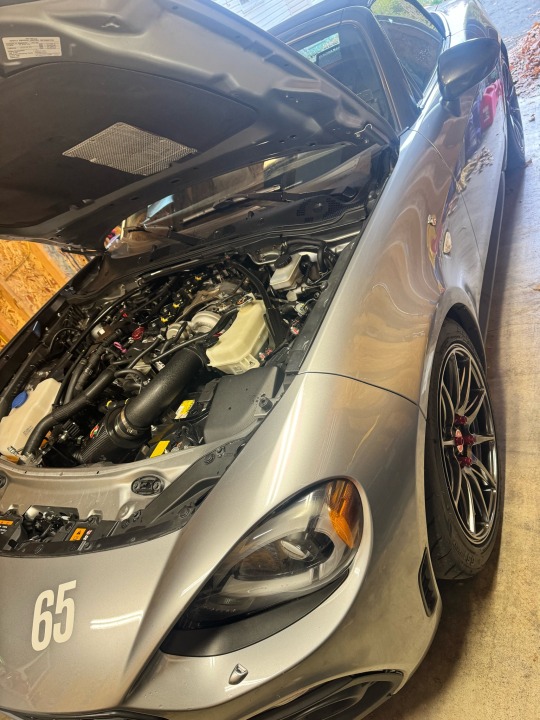
Come on bro! stop looking at my tits and ass we gotta fix the car! 😜
#getting the car ready for a full overhaul#mechanic#abarth#race car#car model#trans#transgender#trans pride#transisbeautiful#mtf#transgirl#girlslikeus#mtf hrt#maletofemale#transformation#trans woman#trans women#transexual#this is what trans looks like#trans community#trans experience#trans feminine#trans is beautiful#trans is sexy#trans positivity#trans women are beautiful#trans is so hot#girls like us#mtf positivity#mtf pride
730 notes
·
View notes
Text

1978 Ford F150 4X4 Short Bed
#ford#ford f 150#ford mustang#classic car#car#cars#chevy#supercar#camaro#chevelle#ford model a#ford pines#coupe#toyota#pontiac#convertible
2K notes
·
View notes